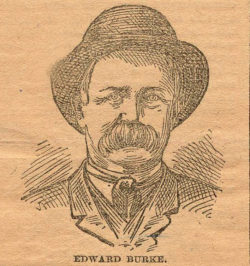E. A. Burke
Edward Austin Burke, known as Major E. A. Burke, was a Louisiana politician during the Reconstruction era.

Courtesy of New York Public Library
Edward Burke. Unidentified
Edward Austin Burke, known as Major E. A. Burke, was a Louisiana politician and newspaper publisher during the Reconstruction era. Originally from Kentucky, Burke moved to New Orleans in 1869 and spent the next twenty years developing a successful political career that ended in notoriety. Upon his arrival in New Orleans, he worked as a stoneyard laborer but within months became a successful railroad administrator. In September 1874, Burke used his influence to aid the Crescent City White League in efforts to overthrow the legally elected Louisiana government in the Battle of Liberty Place. After this introduction to the political sphere, Burke served as city administrator in New Orleans as well as Francis T. Nicholls’s Democratic representative in the Compromise of 1877. He also served as owner/editor of the Times-Democrat newspaper, state treasurer (1878–1888), and director-general of the 1884 World’s Industrial and Cotton Centennial Exposition. He is best known for having stolen hundreds of thousands of dollars from the state treasury and fleeing to Honduras.
Although specifics of Burke’s military career and his rank are subject to speculation, he attained the rank of second lieutenant in the Confederate Army in Texas. He was often referred to as “Major” and at times was even called “Colonel.” His assumed Confederate rank helped accelerate his political career in the years following the Civil War.
Burke, as a railroad administrator in 1874, was asked by the White League to help delay the arrival of federal reinforcements in the hopes that the White League could overthrow the carpetbagger governor William Pitt Kellogg. A coup later called the Battle at Liberty Place helped lead to the return of white control of the state by Bourbon Democrats. As the new regime assumed power, Burke was lauded and appointed commissary of subsistence and placed in charge of voter registration. Within three days, the Kellogg administration was reinstated. Burke’s participation in the coup did not impede his political career, however, and within months he was appointed city administrator for New Orleans.
By 1876 Burke’s popularity among fellow Redeemer Democrats (conservatives bent on ousting the Republicans who controlled Reconstruction governments) led to his appointment as the Democratic representative for governor-elect Francis T. Nicholls at the convention called to resolve the disputed presidential election of 1876. Burke took part in the controversial Wormley Hotel Conference that led to the Compromise of 1877. Under the terms of the agreement, Southern Democrats, who insisted that the Democratic candidate Samuel J. Tilden had won the election, acquiesced to Republican Rutherford B. Hayes’s presidency in exchange for concessions, including the removal of federal troops from Louisiana, Florida, and South Carolina, which in effect ended Reconstruction.
In 1878 Burke was appointed treasurer of Louisiana, a position he held until 1888, thanks in part to his close friendship with Lt. Gov. Louis A. Wiltz, who was elected governor in 1880. In this plum state office, Burke had become so affluent by 1881 that he had purchased the Times and Democrat newspapers to create the Times-Democrat, the most widely circulated newspaper in New Orleans. He also served as editor and contributor.
While allies and admirers frequently described Burke as a polished gentleman, an impressive intellect, and an accomplished administrator, his enemies experienced a different side of his character. In the month following the Battle of Liberty Place, when Burke encountered the reinstated Gov. Kellogg at a New Orleans intersection, he attacked Kellogg, and the men shot at each other with pistols. After a stay in jail, Burke was released at the request of the governor. In 1880 Henry J. Hearsey, the former editor of the Democrat, challenged Burke to a duel because Burke and his friends had acquired the newspaper through legal wrangling. Neither man was injured in that altercation, but when Burke challenged the editor of the Daily Picayune to a duel in 1882 over an editorial questioning his integrity as state treasurer, Burke received a wound in his thigh.
In 1884 the National Cotton Planters’ Association appointed Burke the director-general of the World’s Industrial and Cotton Centennial Exposition that would be held later that year in New Orleans. Here, Burke gained many international allies who served him well in the future, notably the president of Honduras, Luis Bográn. After three months as director-general, Burke left his post with the failing exposition. In 1889, while in London on business, the public became aware of a scandal involving state bonds that suggested Burke had stolen hundreds of thousands of dollars from the state treasury. Burke never returned to New Orleans for trial; instead, he immediately moved with his wife Susan and son Lindsay to Honduras, which had no extradition treaty with the United States. President Bográn awarded Burke several large mining concessions, and he later served many years as an administrator of Honduran nationalized railroads. In 1928 he died a wealthy man in Tegucigalpa.
